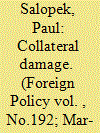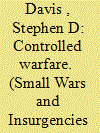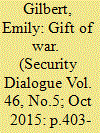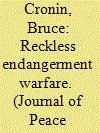|
|
|
Sort Order |
|
|
|
Items / Page
|
|
|
|
|
|
|
| Srl | Item |
| 1 |
ID:
087727


|
|
|
|
|
| Publication |
2009.
|
| Summary/Abstract |
The "Americanization" of the global drug war is now synonymous with the global expansion of the United States (U.S.) Drug Enforcement Administration's (DEA) drug enforcement operations in foreign countries. Recent research posits that the rise in violent crime in Latin America is the "collateral damage" of the "Americanization" of drug enforcement in the region. However, the causal inference of the "collateral damage" thesis is biased because drug enforcement and violent crime in Latin America are endogenously related. This research corrects this bias in two ways. First, we collect data for cases to which the endogenous bias does not apply. Namely, we ask what effect does the operations of the DEA, specifically trafficker immobilization and drug interdiction, have on violent and property crimes in Central American and Caribbean countries where drug producing cartels and narco-insurgent organizations are not indigenous to the political landscape? Second, we estimate the data via a structural equation model. The results lend support to the collateral damage hypothesis. The DEA's coordinated drug enforcement operations contribute to increasing the level of violent and property crimes in the region.
|
|
|
|
|
|
|
|
|
|
|
|
|
|
|
|
| 2 |
ID:
110971


|
|
|
|
|
| Publication |
2012.
|
| Summary/Abstract |
I had been away from Kenya for too long. So when I returned last August, I sought out two long-lost friends.The first was Abdirizak Noor Iftin, an energetic and friendly teacher. He is 26, and he does not belong in Kenya. Iftin is Somali; we had met three years before in his ruined hometown of Mogadishu, where Iftin tutored his young students in English. The job sometimes required darting from house to house under mortar fire. In Somalia one is always in the middle of a war.
|
|
|
|
|
|
|
|
|
|
|
|
|
|
|
|
| 3 |
ID:
085055


|
|
|
| 4 |
ID:
155063


|
|
|
|
|
| Summary/Abstract |
The Vietnam War exacerbated the already tense relationship between Charles de Gaulle and Lyndon B. Johnson; and Franco–American relations reached a nadir in winter 1966–1967 when de Gaulle vetoed a proposed visit to Hanoi by Jean Sainteny, a former colonial official, who Washington had desired to probe North Vietnam’s position. This analysis adds a new wrinkle to the story. Building on research for Marigold: The Lost Chance for Peace in Vietnam (2012), the author reveals that French knowledge of only the Polish version of that peace initiative’s failure, fully blaming the Americans, further soured de Gaulle’s view of Johnson’s handling of the war and American sincerity in seeking peace. The analysis also unveils a new dimension of Henry Kissinger’s involvement in Vietnam diplomacy—prior to the Nixon White House—missing from earlier accounts.
|
|
|
|
|
|
|
|
|
|
|
|
|
|
|
|
| 5 |
ID:
139096


|
|
|
|
|
| Summary/Abstract |
US military operations are increasingly conducted within urban environments and with these operations come the risk of increasing the number of civilian casualties and infrastructure damage. The use of non-lethal weaponry, such as directed-energy weapons, is one method for minimizing collateral damage. This method enables US military forces to effectively fight within urban environments through force escalation capabilities. Using a series of historical examples and future scenarios for urban warfare, this article highlights deficiencies affecting military capabilities in military urban operations, addresses the consequences of collateral damage, assesses the effectiveness of directed-energy weapons in military urban operations and encourages further funding, research and integration of non-lethal weaponry, such as directed-energy weapons, within the US military.
|
|
|
|
|
|
|
|
|
|
|
|
|
|
|
|
| 6 |
ID:
178109


|
|
|
|
|
| Summary/Abstract |
The archive is used both literally and metaphorically as a manifestation of the ubiquity of power and the authority invested in material archives. To work from the margin and in secrecy is a trait of the subaltern quest of both Wadood the bookseller and Dr Nameer, as well as the different characters of the De Molina family. The official history written by the powers that be marginalizes the other. However, the digging of the archives by the subaltern raises the hope of an alternative history that saves the traces of the subaltern. The archive includes physical archives, manuscripts, artefacts, stamps, cassettes, and photos, as amply shown in Fihris. In Ḥiṣn al-turāb, the archive has more of a metaphoric than literal meaning: it is the spectral topos of suppressed desire and recovered memory. The archive enables the subaltern to speak by digging up and even making up archives. Both quests are feverish and reflect the trauma that motivates digging up the past as recovered memory and the desire to keep traces of the past as tokens of a marginalized identity seeking redress. Archives are tokens of the past that threaten the integrity of the history written by the powerful: the hunter. The victims question that history and create nuisance that offers hope of a more just history that includes the marginalized subalterns.
|
|
|
|
|
|
|
|
|
|
|
|
|
|
|
|
| 7 |
ID:
141459


|
|
|
|
|
| Summary/Abstract |
As part of the counterinsurgency initiatives in Afghanistan and Iraq, military forces have been making payments to civilians in cases of ‘inadvertent’ injury, death and/or damage to property. There are no legal norms governing civilian compensation in war. Rather, military payments are seen as a way to help ‘win’ the hearts and minds of the population. This article examines this turn to military payments, with a focus on US practices and the implications for our understanding of contemporary changes to warfare. I suggest that while monetary payments can alleviate short-term economic need, the lack of legal liability is problematic as it may help amplify the impunity of warring soldiers. The article begins with an overview of the bureaucratic ways in which monetary values are attributed to death and injury. It then turns to consider how military payments reinforce the notion of ‘collateral damage’ that is legitimized in international humanitarian law. Finally, I draw upon theories of the gift, and of the gift of war, to interrogate the affective register in which military payments are made, inserted as they are in narratives of sympathy and condolence that bind the giver and receiver in relations of indebtedness and dependence.
|
|
|
|
|
|
|
|
|
|
|
|
|
|
|
|
| 8 |
ID:
141778


|
|
|
|
|
| Summary/Abstract |
As part of the counterinsurgency initiatives in Afghanistan and Iraq, military forces have been making payments to civilians in cases of ‘inadvertent’ injury, death and/or damage to property. There are no legal norms governing civilian compensation in war. Rather, military payments are seen as a way to help ‘win’ the hearts and minds of the population. This article examines this turn to military payments, with a focus on US practices and the implications for our understanding of contemporary changes to warfare. I suggest that while monetary payments can alleviate short-term economic need, the lack of legal liability is problematic as it may help amplify the impunity of warring soldiers. The article begins with an overview of the bureaucratic ways in which monetary values are attributed to death and injury. It then turns to consider how military payments reinforce the notion of ‘collateral damage’ that is legitimized in international humanitarian law. Finally, I draw upon theories of the gift, and of the gift of war, to interrogate the affective register in which military payments are made, inserted as they are in narratives of sympathy and condolence that bind the giver and receiver in relations of indebtedness and dependence.
|
|
|
|
|
|
|
|
|
|
|
|
|
|
|
|
| 9 |
ID:
121796


|
|
|
|
|
| Publication |
2013.
|
| Summary/Abstract |
This article examines how military organizations that are generally committed to following the laws and customs of war exploit what the author terms 'the collateral damage exemption', by employing legally-sanctioned war-fighting strategies that result in significant numbers of civilian casualties. This exemption shields combatants from legal liability for 'incidental' or 'inadvertent' civilian losses and the destruction of civilian objects that may occur during lawful actions. The author argues that military strategies which promote the use of overwhelming force under conditions that are likely to adversely affect the civilian population on a significant scale push the boundaries of legal behavior. Under these conditions, collateral damage is not inadvertent, but the calculated results of policy decisions. Most academics, journalists, and political leaders focus on blatant violations of International Humanitarian Law (IHL), for example, deliberate attacks on civilian populations. However, these actions are in many ways the least interesting from both a policy and scholarly perspective. This is because such violations are usually unambiguous, easily detected, and difficult to defend. More insidious are practices that deliberately straddle the line between legitimate action and violation by exploiting the collateral damage exception to IHL. This article demonstrates that high rates of civilian casualties that occur under the shroud of legality threaten the integrity of the laws and customs of armed conflict.
|
|
|
|
|
|
|
|
|
|
|
|
|
|
|
|
| 10 |
ID:
130114


|
|
|
|
|
| Publication |
2014.
|
| Summary/Abstract |
Sniper rifles and their Anti-Materiel Rifle (AMR) counterparts are significant force multipliers that combine precision, destructive power and psychological impact along with sufficient accuracy to minimize collateral damage. Their capabilities overlap as, given the right ammunition, sniper rifles can be very effective for anti-materiel tasks and many of the heavier caliber weapons are designed for both roles
|
|
|
|
|
|
|
|
|
|
|
|
|
|
|
|
| 11 |
ID:
175819


|
|
|
|
|
| Summary/Abstract |
A key piece of conventional wisdom among scholars of modern armed conflict is that collateral damage is often strategically costly in war. Yet most combatants already know this and take actions after mistakes—most prominently, the distribution of “condolence payments” to civilian victims—in order to mitigate these costs. Do these payments work? This question is important not only for policymakers but also for deeper theoretical debates about how civilians respond to combatant signals in war. To examine these issues, I use micro-level conflict event data on 4,046 condolence payments made by Coalition forces to civilian victims during the Iraq War from 2004 to 2008, matching it with corresponding data on collateral damage and insurgent violence. The results of this analysis reveal that post-harm compensation does significantly diminish local rates of insurgent violence, and that this is true across different types of payments (cash handouts or in-kind assistance). Ultimately, these patterns can be best explained by a rationalist mechanism in which civilians update their beliefs about violent events based on new information about combatants’ wartime intentions. The results thus provide a compelling strategic rationale for combatants to compensate their victims in war, and suggest that civilians are not blinded to new information about conflict dynamics by their preexisting biases.
|
|
|
|
|
|
|
|
|
|
|
|
|
|
|
|
|
|
|
|
|